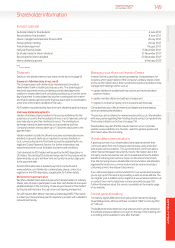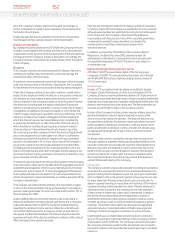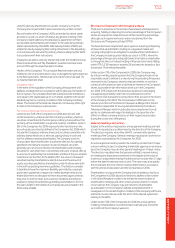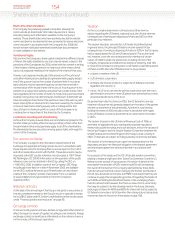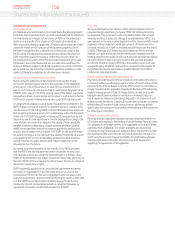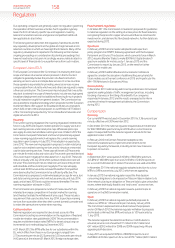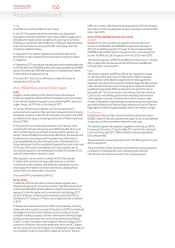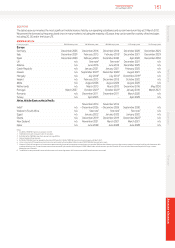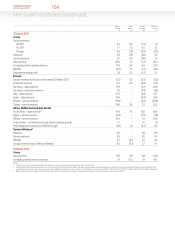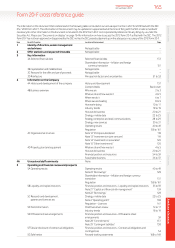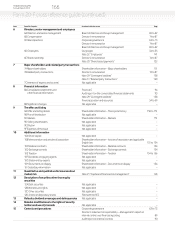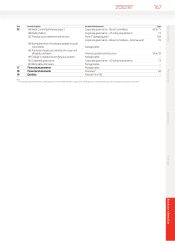Vodafone 2012 Annual Report Download - page 160
Download and view the complete annual report
Please find page 160 of the 2012 Vodafone annual report below. You can navigate through the pages in the report by either clicking on the pages listed below, or by using the keyword search tool below to find specific information within the annual report.
158
Vodafone Group Plc
Annual Report 2012
Our operating companies are generally subject to regulation governing
the operation of their business activities. Such regulation typically
takesthe form of industry specic law and regulation covering
telecommunications services and general competition (antitrust)
lawapplicable to all activities.
The following section describes the regulatory frameworks and the
keyregulatory developments at the global and regional level and in
selected countries in which we have signicant interests. Many of the
regulatory developments reported in the following section involve
ongoing proceedings or consideration of potential proceedings that
have not reached a conclusion. Accordingly, we are unable to attach a
specic level of nancial risk to our performance from such matters.
European Union (‘EU’)
The European Commission (the ‘Commission’) is reviewing the future
scope and nature of universal service provision in the EU. Current
obligations generally involve the provision of a xed connection
allowingaccess to voice and simple data services. In some countries
those operators responsible for providing universal services receive
compensation from a fund to which we and others are required to make
a nancial contribution. The Commission has indicated that it would be
reluctant to extend the scope of these funds to include very high speed
broadband deployment and that additional nancing for such projects
should instead be sought from general taxation. The Commission has
also published a broadband strategy which proposes that the European
Investment Bank offer support for broadband infrastructure projects
which full certain criteria and proposes to use €9 billion (£7.5 billion)
ofthe “Connecting Europe Facility” to fund broadband networks and
digital services from 2014.
Roaming
The current roaming regulation (the ‘roaming regulation’) entered into
force in July 2009 and requires mobile operators to supply voice and
text roaming services under retail price caps. Wholesale price caps
alsoapply to voice, text and data roaming services. In March 2012 the
Commission, European Parliament and Council provisionally agreed
anew roaming regulation which will replace the current roaming
regulation upon its expiry in July 2012. Final adoption is expected by
June 2012. The new roaming regulation proposes to retain retail price
caps for voice and text roaming services and to introduce a new retail
cap for data roaming services. These caps will be set at 29 eurocents
perminute for retail outbound voice calls, 9 eurocents per retail text and
70 eurocents per megabyte for retail data from 1 July 2012. These will
reduce annually until July 2014 when outbound retail voice calls will
beset at 19 eurocents per minute, retail texts at 6 eurocents per text
and retail data at 20 eurocents per megabyte. The caps will apply
untilatleast 2016 but would be removed thereafter if competition
weredeemed by the Commission to be sufciently effective. The
Commission also proposes to retain wholesale price caps for voice, text
and data roaming services which will reduce annually until July 2014,
apply until at least 2018 and could be removed thereafter. The new
roaming regulation will expire in 2022.
The Commission also proposed a number of measures which are
intended to increase competition in the retail market for roaming
(andthereby facilitate the withdrawal of price caps). These include a
requirement that users be able, from July 2014, to purchase roaming
services from a provider other than their current domestic provider and
to retain the same phone number when roaming.
Call termination
National regulators are required to take utmost account of the
Commission’s existing recommendation on the regulation of xed and
mobile termination rates published in 2009. This recommendation
requires mobile termination rates (‘MTRs’) to be set using a long run
incremental cost methodology by December 2012.
At 31 March 2012 the MTRs effective for our subsidiaries within the
EU,which differs from those in our Europe region, ranged from
2.70eurocents per minute (2.25 pence) to 5.30 eurocents perminute
(4.42 pence), at the relevant 31 March 2012 foreign exchange rates.
Fixed network regulation
InOctober 2011 the Commission consulted on proposals for guidelines
to national regulators on the setting of access prices for xed networks,
recognising that prices for copper services will inuence incentives for
investment in, and demand for, bre based networks. Further details are
expected during 2012.
Spectrum
In February 2012 the Commission adopted its radio spectrum
policyprogramme (‘RSPP’), following agreement with the European
Parliament and Council. The decision, which came into force in March
2012, requires Member States to make 800 MHz (‘digital dividend’)
spectrum available for mobile use by 1 January 2013 and the
Commission to report, by January 2015, on the need for further
spectrum for mobile use.
In February 2012 the World Radiocommunications Conference
agreedto consider the allocation of additional frequency bands for
future mobile use at the next conference in 2015 and in particular the
694–790MHz band in Europe and Africa.
Net neutrality
In December 2011 national regulators sent questionnaires to European
operators seeking details of trafc management practices, including
blocking of services or throttling of bandwidth. Our companies
responded in January 2012 and the results are expected to inform
areview of network management activities by the Commission
during2012.
Europe region
Germany
Our current MTR was reduced in December 2010 to 3.36 eurocents per
minute, effective until 30 November 2012.
In December 2011 the national regulator enquired about the demand
for 900/1800 MHz spectrum beyond 2016 when current licences
expire. It is expected that the national regulator will ask for formal
applications later in 2012.
In February 2012 the German Parliament adopted a new
telecommunications law to implement amendments to the
Europeanregulatory framework, including certain new measures
toprotect consumers.
Italy
In September 2011 we acquired 2x10 MHz of 800 MHz spectrum,
2x5MHz of 1800 MHz spectrum and 2x15 MHz of 2.6 GHz spectrum
fora cost of €1.26 billion (£1.1 billion). The licences are valid until 2030.
In November 2011 the national regulator adopted a decision to cut our
MTRs to 0.98 eurocents by July 2013, which we are appealing.
In January 2012 the national regulator issued the nal decision
concerning obligations to be imposed on Telecom Italia in relation to its
bre network, placing an obligation on Telecom Italia to give unbundled
access, where technically feasible, and “end to end” access services.
In February 2012 the national regulator issued a questionnaire to
operators on the SMS termination market.
Spain
In February 2012 the national regulator published proposals to
reduceour MTRs to 1.09 eurocents per minute by January 2014.
TheCommission expressed serious doubts about the proposals
andon30 March 2012 the national regulator withdrew its proposals
andinstead conrmed that MTRs will reduce to 1.09 eurocents by
1July2013.
The national regulator has determined that our contributions to
universal service costs should be €17 million (£14.2 million) and
€47million (£39.2 million) for 2008 and 2009 respectively. We are
appealing both decisions.
In July 2011 we acquired 2x10 MHz of 800 MHz spectrum and
2x20MHz of 2.6 GHz spectrum for a cost of €517 million (£431 million).
Regulation



